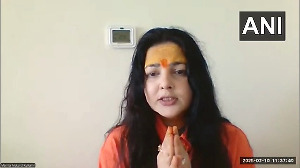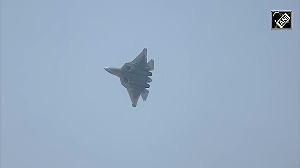
Uttar Pradesh already has the largest ministry in the country but Chief Minister Mulayam Singh Yadav says he is willing to further expand his council of ministers from 98 to 105 to accommodate Congress legislators.
Yadav's willingness is a symbol of the times when the desire for power far outweighs the political morality politicians across the spectrum are so fond of declaiming from podiums all over the country.
It would appear that after the Samajwadi Party's long stint as the Opposition party in Uttar Pradesh and his bitter rivalry with former chief minister Mayawati, Mulayam Singh is keen to hold on to power at any price.
Not only did he encourage defections en masse from Mayawati's Bahujan Samaj Party en masse to his Samajwadi Party, but he also appointed all 26 defecting BSP members as ministers. Now, he is dangling the bait of a ministerial appointment to Congress legislators, who have so far refused to bite.
The present government coalition in Uttar Pradesh, led by the Samajwadi Party, also comprises Ajit Singh's Rashtriya Lok Dal, Loktantrik Congress Party, Samajwadi Janata Party, and the Samata Party.
"The very composition of his (Singh's) government shows how opportunistic elements have joined hands for seizing power," averred Bharatiya Janata Party General Secretary Mukhtar Abbas Naqvi.
Naqvi did not comment on the fact that the BJP-led coalition at the Centre too comprises strange bedfellows, former foes who have become allies for the sake of power.
While the Uttar Pradesh government beats all other states for the size of its ministry, Bihar is not far behind, with Chief Minister Rabri Devi's council of ministers having 82 members, including 30 cabinet ministers.
Rabri Devi picked up the refrain that the size of her ministry is a direct consequence of coalition-era politics where various partners simply have to be accommodated. The Congress is a part of the ministry.
Since 2000, her government has successfully overcome the Congress demand for important portfolios for its members. The Congress has ignored critical developments in the state like the killing of three students in alleged encounters in January, which led to much criticism against the chief minister.
The RJD's electoral support from Muslims and Yadavs has stood the Rabri Devi government in good stead. Consequently, there is little threat to her government.
The third largest ministry in the country is Sushil Kumar Shinde's Democratic Front government in Maharashtra. Despite Shinde's assertion that he would have a small ministry, his coalition government comprises 69 ministers, 23 of them at cabinet rank.
Shinde has given his government's principal ruling partner, the Nationalist Congress Party, 10 cabinet berths.
West Bengal has the fourth largest government with 44 ministers under Chief Minister Buddhadeb Bhattacharya.
The Communist Party of India (Marxist)-led Left Front government has been in power since 1977, with Jyoti Basu having led the government till he stepped down in November 2000.
Andhra Pradesh Chief Minister Nara Chandrababu Naidu heads the fifth largest government of 40 ministers. The Telugu Desam Party's 29 Lok Sabha MPs provide steady support to the National Democratic Front alliance, which has given Naidu much clout with the central government.
The country's smallest ministries?
The Union Territory of Pondicherry has the country's smallest council of ministers with just five ministers under Chief Minister N Rangaswamy.
The National Capital Territory of Delhi has the second smallest council of ministers. Chief Minister Shiela Dixit leads a team of six, including former Delhi mayor Mahendra Singh Saathi and Ajay Maken, nephew of assassinated Congress member of Parliament Lalit Maken.
The next smallest ministry is Haryana with 11 members led by Om Parkash Chautala, the Indian National Lok Dal leader.
Goa has the fourth smallest council of ministers under Chief Minister Manohar Parrikar. It has a total of 13 ministers.
Jammu and Kashmir, led by Chief Minister Mufti Mohammed Sayeed, and Tripura led by Chief Minister Manik Sarkar tie for the fifth smallest ministry. Both states have 17 ministers each.
Design: Uday Kuckian






 © 2025
© 2025